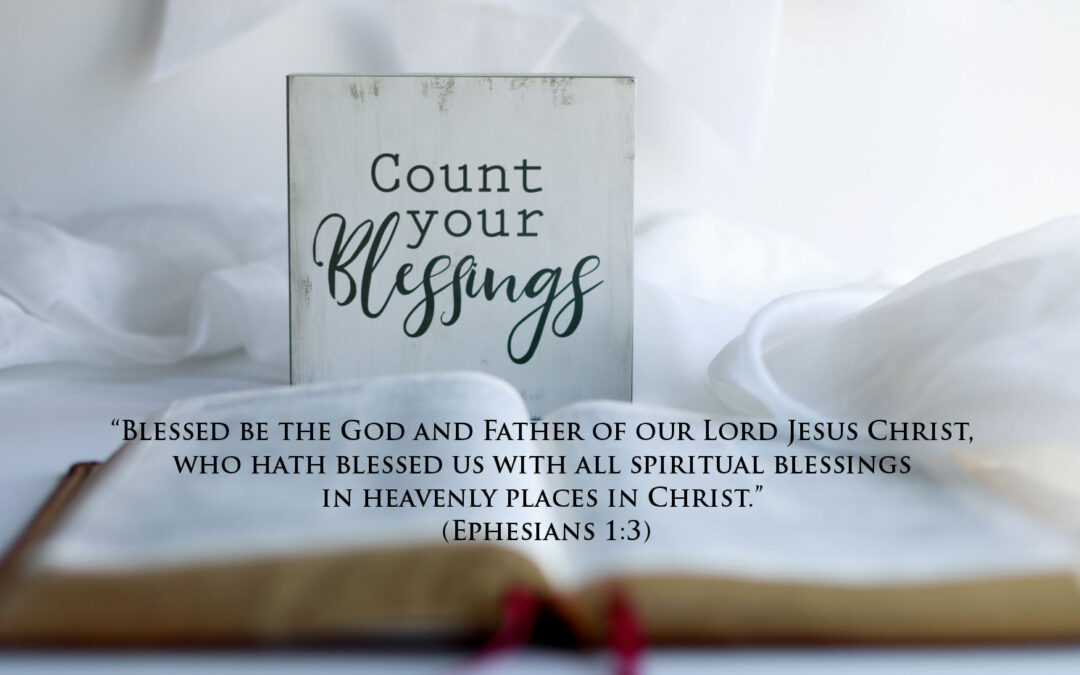“Blessed be the God and Father of our Lord Jesus Christ,
who hath blessed us with all spiritual blessings in heavenly places in Christ.” (Ephesians 1:3)
When a bounteous, benevolent God establishes and secures an everlasting Covenant with his people, he incorporates such spiritual blessings as redemption from the curse of the Law by forgiveness of sins, adoption into his kingdom family, and sanctification by the Spirit through faith in Christ (Gen. 28:4; Gal. 3:13-14; Rom. 4:7-8, 13).
All spiritual blessings that Christ merits by his position and work – justification, sanctification, and glorification – are all bestowed in their entirety on the children of God at the moment of salvation because of this Covenant of Grace. And then step by step these believers come to discover what blessings they possess in full as they journey down the road of salvation to the Celestial City.
Inherent in these spiritual blessings are abundant evidences that the Father loves his own. One example in this body of evidence is the fact that God draws those he chooses to Christ by the Spirit through the Word. For no man can come to Christ except the Father draw him (John 6:44). And those he draws, he loves with an everlasting love. He loves those he adopts into his family even as he loves his only begotten Son (John 17:20, 23). And those who have received the adoption of sons love the Father in return, for a portion of God’s spiritual blessings cause the love of Christ to be “shed abroad in our hearts,” (Rom. 5:5), turning our affections toward him (Prov. 8:17; 1 John 4:19; John 14:21).
Another spiritual blessing that the Father bestows on his children is infusion of spiritual life into their soul by which they live to him. This is yet another evidence of the Father’s love for us (Ezek. 16:6; Eph. 2:4-5). For God not only loves those who are clothed in the righteous of Christ (Psa. 146:8), but all those who seek and follow after righteousness (Prov. 15:9), which through grace he causes us to do.
As the Apostle John writes, “Behold, what manner of love the Father has bestowed upon us, that we should be called the sons of God,” (1 John 3:1). For all these reasons, we can rest assured that nothing in this world nor the one to come can ever separate us from God’s strong and enduring love for us (Jer. 31:3; John 13:1; Rom. 8:38-39). This is so because of the Covenant of Grace which he has established with us and the bounty of inherent spiritual blessings he bestows on us in Christ. As Isaiah 54:10 states, “the mountains shall depart, and the hills be removed; but my kindness shall not depart from thee, neither shall the covenant of my peace be removed, saith the Lord that hath mercy on thee.”
Contemplations:
- Lord, I am free from condemnation (Rom. 8:1) and assured of glory (Col. 1:27; 1 John 5:12). I am a partaker in Christ’s wisdom, righteousness, sanctification, and redemption (1 Cor. 1:30), blessed with all spiritual and heavenly blessings (Eph. 1:3), having been made complete in him, though imperfect in myself (Col. 2:10).
- I know that God is my God. The great blessing promised through the Covenant of grace that God has established with his people is that God will be our God (Heb. 8:10). This relationship is made evident to my soul by my coming to and closing with Christ the Mediator of the Covenant; for he promised to make an everlasting covenant with such as come to him (Isa. 55:3).
- I know that God is my God and that being called as one of his servants is an unspeakable blessing (Isa. 41:9-10). I know that God is my God because the Law of God is in my heart, and my delight is to do his will (Jer. 31:33; Psa. 40:8). My fear of God, discerned by my desire to turn away from evil, shows that I choose the Lord for my God, voluntarily giving my life to him to obey his voice and keep his ways (Deut. 26:17-19; Jer. 7:23).
- I know that God is my God because of my desire to seek heavenly things above earthly. For those who do, God is not ashamed to be called their God (Heb. 11:11-16).
- As John Fairfax said, I will “walk humbly with God … seek him early … praise and exalt him … love him above all with all my heart … turn to him whenever I shall depart from him … and trust in him continually for all things.”[1]
Further References for Eph. 1:3:
1 Peter 1:3; Rom. 1:7; Matt. 16:17; 2 Cor. 1:4
[1] John Fairfax, The True Dignity of St. Paul’s Elder Exemplified in the Life of Mr. Owen (London: H.H. for Tho. Parkhurst .., 1681), 136.


